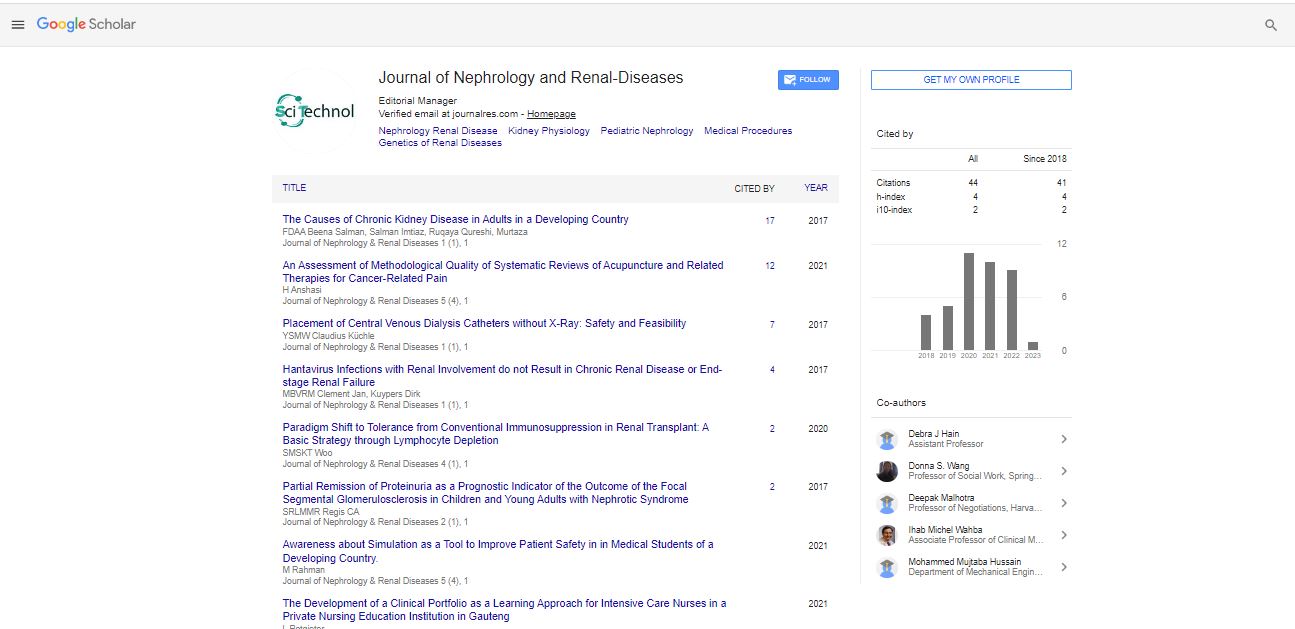Opinion Article, J Nephrol Ren Dis Vol: 7 Issue: 1
Rare and Genetic Kidney Diseases: Understanding the Causes, Symptoms, and Treatment Options
Eugene Gerszten*
Department of Medicine, Boston University, Boston, Massachusetts, United States of America
*Corresponding Author: Eugene Gerszten
Department of Medicine, Boston University, Boston, Massachusetts, United States of America
E-mail: gerszteneugene@gmail.com
Received date: 20 February 2023, Manuscript No. JNRD-23-96917;
Editor assigned date: 22 February 2023, PreQC No. JNRD-23-96917(PQ);
Reviewed date: 09 March 2023, QC No. JNRD-23-96917;
Revised date: 16 March 2023, Manuscript No. JNRD-23-96917(R);
Published date: 23 March 2023, DOI: 10.4172/2576-3962.1000028
Citation: Gerszten E (2023) Rare and Genetic Kidney Diseases: Understanding the Causes, Symptoms, and Treatment Options. J Nephrol Ren Dis 7:1.
Description
Rare and genetic kidney diseases are a group of disorders that affect the kidneys and urinary tract. They can cause a variety of symptoms and complications, ranging from mild to life-threatening. In this article, we will discuss the causes, symptoms, and treatment options for rare and genetic kidney diseases.
Causes
There are many different causes of rare and genetic kidney diseases. Some are caused by inherited genetic mutations, while others are caused by environmental factors. Some common causes of rare and genetic kidney diseases include:
Polycystic Kidney Disease (PKD): PKD is a genetic disorder that causes multiple cysts to form in the kidneys. These cysts can eventually cause the kidneys to fail.
Alport syndrome: Alport syndrome is a genetic disorder that affects the structure of the kidneys. It can cause kidney failure, hearing loss, and eye problems.
Fabry disease: Fabry disease is a genetic disorder that affects the metabolism of lipids. It can cause kidney damage, heart disease, and stroke.
Nephrotic syndrome: Nephrotic syndrome is a group of disorders that affect the glomeruli, the tiny filters in the kidneys. It can cause protein to leak into the urine, which can lead to swelling and other symptoms.
Symptoms
The symptoms of rare and genetic kidney diseases can vary depending on the specific disorder. Some common symptoms include:
• Proteinuria (protein in the urine)
• Hematuria (blood in the urine)
• Swelling of the hands, feet, and face
• High blood pressure
• Fatigue
• Shortness of breath
• Decreased urine output
• Nausea and vomiting
• Itching
Treatment Options
The treatment options for rare and genetic kidney diseases depend on the specific disorder and the severity of the symptoms. Some common treatment options include:
Medications: Medications may be used to manage symptoms such as high blood pressure, proteinuria, and anemia.
Dialysis: Dialysis is a medical treatment that performs the function of the kidneys for people whose kidneys are not functioning properly. The kidneys are responsible for removing waste and excess fluids from the blood. When the kidneys fail, waste and excess fluids build up in the body, leading to serious health problems.
Kidney transplant: In some cases, a kidney transplant may be necessary. A kidney transplant is a surgical procedure that replaces a diseased kidney with a healthy one from a donor.
Lifestyle changes: Lifestyle changes such as a healthy diet, exercise, and avoiding tobacco and alcohol may be recommended to manage symptoms and slow the progression of the disease.
Conclusion
Rare and genetic kidney diseases are a group of disorders that can cause a variety of symptoms and complications. They are caused by a range of factors, including inherited genetic mutations and environmental factors. The symptoms of rare and genetic kidney diseases can vary, but often include proteinuria, hematuria, and swelling. Treatment options include medications, dialysis, kidney transplant, and lifestyle changes. Early diagnosis and treatment are important for managing symptoms and preventing complications.
 Spanish
Spanish  Chinese
Chinese  Russian
Russian  German
German  French
French  Japanese
Japanese  Portuguese
Portuguese  Hindi
Hindi 
